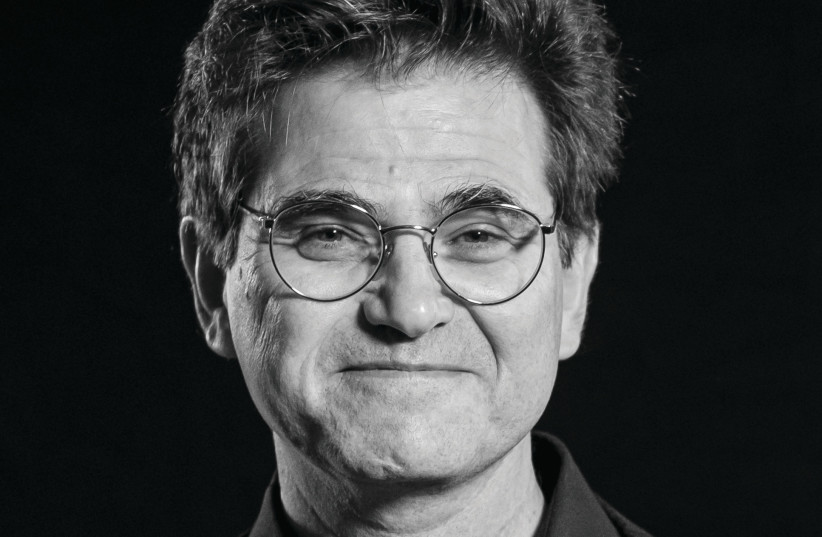Eitan Anner’s latest movie, The Good Person, which opened in Israel on March 23, tells the story of Sharon (Moran Rosenblatt), a feminist filmmaker making a movie that is intended to be the comeback of a once-great secular entertainer, Uzi Silver, who is now an ultra-Orthodox rabbi (Rami Heuberger). That story may suggest Uri Zohar’s life, but Anner says that it’s about more than that.
Zohar, who died last year, was a great Israeli comedian and director who dropped out of the entertainment industry when he was at the height of his fame in the late 1970s. Clearly, his story is part of the inspiration behind The Good Person. Late in his life, Zohar tried to start making movies again that were in line with his religious values, which was the subject of a documentary, Zohar: The Return, in 2018. Zohar’s comeback film was never released.
“Of course, Uri Zohar was a prominent figure who dropped out,” just like the character in the movie, says Anner. But he wasn’t the only one, and an encounter with another prominent entertainment figure who became ultra-Orthodox was on his mind when he wrote the script: Mordecai “Pupik” Arnon, an actor/singer/comic who was a contemporary of Zohar.
Anner, who grew up in Jerusalem in a secular family, was around 10 when he met Arnon at an after-school event. The secular/religious divide colors so much of life in the capital, and there was a moment in what could have been an innocuous children’s program that made a lasting impression.
“It was about religion and philosophy, and he spoke about how he found God, and I asked: why doesn’t God reveal himself to us? And he said, ‘Why would God reveal himself to a 10-year-old brat?’ I wasn’t offended, but my father called the place and he said, ‘No one is going to call my son a brat.’ This is my personal story about that era of Israeli culture.”

Another inspiration behind the rabbi character in the film was a childhood friend of Anner’s, a gifted musician, who also abandoned the arts for religion.
“It was like there was a big hole and suddenly – poof! – he was gone,” Anner said.
The movie acts as food for thought
AS THE idea for The Good Person took shape, he found himself thinking a great deal about the connections and contradictions between ultra-Orthodoxy and the arts.
“Being an artist and being ultra-Orthodox have something in common: You strive for perfection without any material rewards,” he said.
“Being an artist and being ultra-Orthodox have something in common: You strive for perfection without any material rewards.”
Eitan Anner
But both Silver and Sharon have a complex and shifting range of motivations behind everything they do, and that gives the story its tension. Sharon makes serious, non-commercial films about women’s issues, but now that she is estranged from her wealthy husband, she is in deep financial trouble. So when she learns that Uzi Silver wants to make a comeback Bible epic movie with a big budget, and she gets the opportunity to produce it, she agrees in spite of the fact that he won’t allow women on the set. She finds herself betraying her principles, just to keep a roof over her head.
It’s a conflict that Anner has thought about a great deal. He makes personal films about stories that really mean something to him, like his previous movie, A Quiet Heart, in which Ania Bukstein stars as a young, secular musician living alone in Jerusalem, who feels threatened by her ultra-Orthodox neighbors and finds herself drawn to a Christian monk.
The film won the Grand Prize at the Tallinn Black Nights Film Festival in 2016. Anner has made a number of other films, including Love & Dance, about a boy and girl in Israel who are coached by Russian ballroom dancers. In spite of his successes, he knows how hard it can be to make a living while working in the arts.
“Being an adult in the 21st century, especially if you have a family, you probably have to do something that you don’t like to keep the lights on and make a living. We burn out or we just revolt.
“The protagonist in The Good Person is a woman who basically sells out, who gives up on being a good person. It turns out not to be a good deal,” he said. “Eventually, she realizes that the price is too high.”
The director, who was raised in the same Kiryat Hayovel neighborhood where A Quiet Heart was set, said he grew up going to movies at a now-defunct local theater there, which was not exactly an arthouse cinema. “You would get three James Bond movies on one ticket,” he recalled.
But when he attended a program at the Israel Museum, he got into making 8 mm films, which was the beginning of “a long and not very obvious road to the Sam Spiegel Film School,” where he now teaches screenwriting.
Anner, who is married to theater director and actress Tamar Keynan, said it isn’t easy these days to get audiences back into the theaters, following the COVID pandemic and the increased popularity of streaming services.
“I hope people will sympathize with Sharon,” he said. “I hope people won’t judge her. I don’t judge her.”
